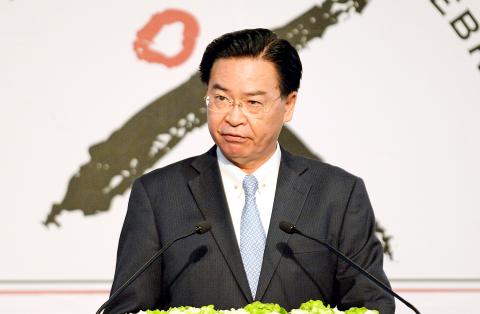Minister of Foreign Affairs Joseph Wu (吳釗燮) yesterday criticized China for lodging a protest against Japan’s Sankei Shimbun after it published an interview with him, saying that Beijing infringed on the press freedom of the two Asian democracies.
“It is astonishing that the authoritarian China not only cannot tolerate freedom of speech and of the press inside its borders, but it has also interfered with that enjoyed by the two most democratic Asian nations with the greatest press freedom,” Wu was quoted by Ministry of Foreign Affairs spokesman Andrew Lee (李憲章) as saying.
The incident proves that China poses a threat to the global values of freedom and democracy, Wu said, calling on like-minded nations to work together to prevent the trend from spreading.

Photo: Lin Cheng-kung, Taipei Times
China’s protest also shows that “we have done something right,” Wu added.
In the interview published on Wednesday, Wu called for Taiwan and Japan to initiate a security dialogue on the grounds that ensuring security is a shared responsibility of the two nations.
Wu also criticized China for limiting the room for interpretation of its “one China” principle, which he said cannot be accepted by Taiwanese.
After the US severed diplomatic ties with Taiwan in 1979, it enacted the Taiwan Relations Act that laid down a legal foundation for a security dialogue between Washington and Taipei, the report said.
However, there is no legal foundation for exchanges between Japan and Taiwan after they broke off relations in 1972, it added.
The Chinese embassy in Japan lodged a stern protest against the Sankei Shimbun, saying that Taiwan is a part of China and that the article included portions that advocated Taiwanese independence.
When the newspaper opened a branch office in China, it pledged to abide by the “one China” principle in its reporting, a consensus that the paper had contravened, the embassy said.
“In the process of the normalization of China-Japan relations, we hope to see the Sankei Shimbun publish reports that are conducive to the establishment of mutual understanding between the Japanese and Chinese people,” the embassy said.
Relations between Taiwan and Japan are handled by two non-governmental agencies, the Taiwan-Japan Relations Association and the Japan-Taiwan Exchange Association, which last year changed their names to better reflect their functions.
The Taiwan-Japan Relations Association was previously called the Association of East Asian Relations, while the Japan-Taiwan Exchange Association was previously called the Interchange Association, Japan.

AIR SUPPORT: The Ministry of National Defense thanked the US for the delivery, adding that it was an indicator of the White House’s commitment to the Taiwan Relations Act Deputy Minister of National Defense Po Horng-huei (柏鴻輝) and Representative to the US Alexander Yui on Friday attended a delivery ceremony for the first of Taiwan’s long-awaited 66 F-16C/D Block 70 jets at a Lockheed Martin Corp factory in Greenville, South Carolina. “We are so proud to be the global home of the F-16 and to support Taiwan’s air defense capabilities,” US Representative William Timmons wrote on X, alongside a photograph of Taiwanese and US officials at the event. The F-16C/D Block 70 jets Taiwan ordered have the same capabilities as aircraft that had been upgraded to F-16Vs. The batch of Lockheed Martin

US President Donald Trump yesterday announced sweeping "reciprocal tariffs" on US trading partners, including a 32 percent tax on goods from Taiwan that is set to take effect on Wednesday. At a Rose Garden event, Trump declared a 10 percent baseline tax on imports from all countries, with the White House saying it would take effect on Saturday. Countries with larger trade surpluses with the US would face higher duties beginning on Wednesday, including Taiwan (32 percent), China (34 percent), Japan (24 percent), South Korea (25 percent), Vietnam (46 percent) and Thailand (36 percent). Canada and Mexico, the two largest US trading

GRIDLOCK: The National Fire Agency’s Special Search and Rescue team is on standby to travel to the countries to help out with the rescue effort A powerful earthquake rocked Myanmar and neighboring Thailand yesterday, killing at least three people in Bangkok and burying dozens when a high-rise building under construction collapsed. Footage shared on social media from Myanmar’s second-largest city showed widespread destruction, raising fears that many were trapped under the rubble or killed. The magnitude 7.7 earthquake, with an epicenter near Mandalay in Myanmar, struck at midday and was followed by a strong magnitude 6.4 aftershock. The extent of death, injury and destruction — especially in Myanmar, which is embroiled in a civil war and where information is tightly controlled at the best of times —

China's military today said it began joint army, navy and rocket force exercises around Taiwan to "serve as a stern warning and powerful deterrent against Taiwanese independence," calling President William Lai (賴清德) a "parasite." The exercises come after Lai called Beijing a "foreign hostile force" last month. More than 10 Chinese military ships approached close to Taiwan's 24 nautical mile (44.4km) contiguous zone this morning and Taiwan sent its own warships to respond, two senior Taiwanese officials said. Taiwan has not yet detected any live fire by the Chinese military so far, one of the officials said. The drills took place after US Secretary